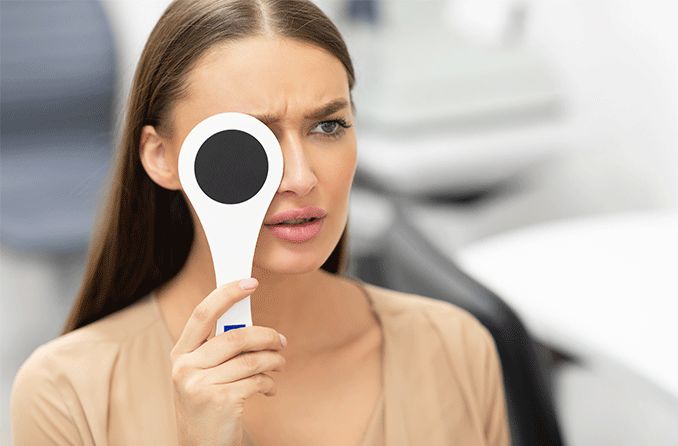Sudden blurry vision in one eye: What does it mean?

Experiencing blurry vision, whether temporarily or permanently, is somewhat common among people who require vision correction. What’s less common is having blurred vision in only one eye.
Blurred vision in one eye can be chalked up to something as simple as having different prescription strengths in each eye. However, it’s also possible for sudden blurry vision in one eye to indicate a serious problem in the eye or brain.
Causes of blurry vision in one eye
Though blurry vision is commonly caused by something minor, such as a refractive error, it’s possible for a more serious condition to be responsible. Other symptoms are typically present when the cause of blurred vision is more critical.
Common causes of blurred vision in one eye
Many of the common causes listed below are low-risk when detected and treated early. However, chronic conditions such as cataracts, age-related macular degeneration (AMD), glaucoma and diabetic retinopathy can cause serious damage to your vision if not closely monitored or treated promptly with corrective surgery.
Refractive errors (nearsightedness, farsightedness or astigmatism)
Age-related vision changes (presbyopia)
Conjunctivitis (pink eye)
High blood sugar
Outdated/incorrect vision prescription
Less-common but critical causes of sudden blurred vision in one eye
As previously mentioned, there are usually other symptoms that may accompany blurry vision when the cause is more critical. However, it’s always best to consult with an eye doctor if you notice any sudden blurry vision in one eye.
Stroke
Transient ischemic attack (stroke-like symptoms that may be indication of an imminent stroke)
Optic neuritis (inflammation of the optic nerve)
Brain tumor
Hyphema (blood that collects in front of the eyeball due to eye trauma)
Temporal arteritis (inflammation of the arteries near your temples, resulting in a throbbing headache that can cause blurred vision and potentially blindness)
SEE RELATED: Sudden blurry vision
Symptoms that may coincide with blurred vision in one eye
Blurry vision in one eye is typically accompanied by other symptoms. It’s important to differentiate common symptoms from serious symptoms that require immediate medical attention.
Common symptoms that may occur alongside blurry vision in one eye
Dry eyes
Eye itchiness and/or redness
Headache or nausea (commonly associated with a migraine)
Seeing glare or halos around lights
Please be advised that though these are listed as “common” symptoms associated with blurry vision in one eye, it is always wise to consult with your eye doctor, especially if symptoms persist.
Serious symptoms that may be present with blurry vision in one eye
If you experience any of the following symptoms — either on their own or in addition to sudden blurry vision in one eye — you should consider it a medical emergency and seek medical attention immediately.
Change in level of alertness, responsiveness or consciousness
Vision that is significantly reduced or lost
Eye pain or injury
Numbness or weakness on one side of the body and/or facial drooping
Difficulty speaking
Sudden severe headache
Change in behavior or mental status, such as delirium, confusion, hallucinations and lethargy
SEE RELATED: Dizziness and blurred vision
Blurry vision in right eye vs. blurry vision in left eye
If you notice blurred vision in your right or left eye, it may indicate that one of your eyes is weaker than the other. This is common and can be corrected by updating your vision prescription.
It’s also possible that you’re experiencing blurred vision in your non-dominant eye. Your dominant eye typically provides a little more input to the brain and “leads” or is preferred over your non-dominant eye. This is noticed more when doing activities that require the focus of one eye, such as shooting/hunting, photography and certain sports, like baseball or golf.
Not sure which is your dominant eye? You can perform a dominant eye test from the comfort of your own home. The test is a quick and easy way to determine which eye is dominant and may explain why vision in the opposite eye appears blurry during certain tasks.
Treatment for blurred vision in one eye
Treatment for blurred vision in one eye depends on the cause, making it all the more important to see an eye care professional. Your eye doctor will be able to assess your blurred vision, as well as any other symptoms, and determine the best course of action to get your vision back to normal.
READ MORE: Blurry vision and COVID
Page published on Monday, January 4, 2021






